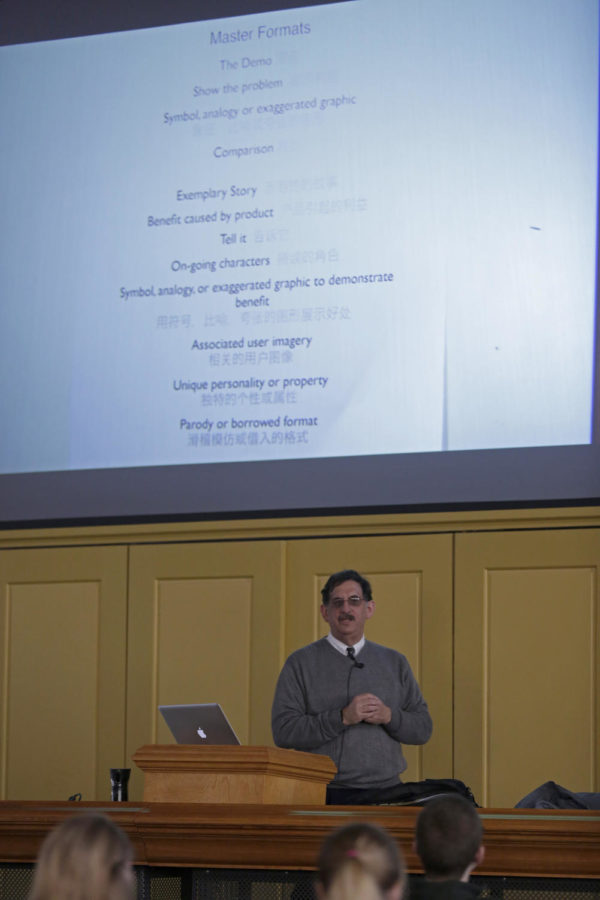ISU jumps the language barrier, professors use translations in classes
Brian Achenbach/Iowa State Daily
Associate professor Jay Newell has his slides in both English and Chinese to help international students to learn better in his class.
February 24, 2014
Professors at Iowa State offer classes with Chinese translations. Three classes are working toward it, while one is already doing it.
“I think it’s a good project. It’s been nominated for a national award, and we will find out next month,” said Jay Newell, associate professor at the Greenlee School of Journalism and Communication. The award is for Campus Internationalization.
The three classes currently working toward dual language coursework include journalism and mass communications 101 taught by assistant professor Michael Dahlstrom, theatre 110 taught by lighting designer James Trenberth and political science 251 taught by professor Richard Mansbach.
As for advertising 230, Newell posts lecture notes, power points and the syllabus in Chinese and English.
Newell said that it really started when he realized that he had a number of students in the class who just weren’t understanding what he was talking about.
“About two thirds of all international undergraduates here at Iowa State are all Chinese speaking,” Newell said.
He said it turns out most of them were in their first couple semesters at Iowa State, and they had just come from China.
The translation of slides from English to Chinese did cost money. We had a graduate student do it and it cost about a $1,000 to translate, but it can be used for four, five or six years, so it’s not a vast amount of money, Newell said.
To see if his work was beneficial, Newell had his students take a survey.
“The feedback from the international students is exactly what you think,” Newell said. “‘This is great, this helps me learn English’.”
Lu Cai, a student in liberal arts and sciences specials, said that Newell does not speak Chinese, so it is hard to catch up with him when his talking speed is a little fast, so the translations help.
But what was really interesting was how the American students took to it, Newell said. Most people thought it was a good idea because it helped other students.
Newell said that he thinks it bothers students when they see other students struggling. “I was pretty proud of that.”
“I do think it helps other students. I know we have a lot of foreign exchange students here, and I think it would be hard to have to learn everything in English all the time,” said Corbin Jerde, a freshman in engineering.
Newell said attention in class also went up. He had his assistant observe students at one point every day.
I didn’t want the two languages fighting, so English is bigger and bolder on the slides, only because some students don’t need the Chinese translations, Newell said.
He has been working on the program for three or four years. The future plan is to expand to different courses, Newell said.
Mansbach posts course notes and his syllabus in Chinese and English for political science 251. Trenberth, who teaches theater 110, also posts his syllabus in both Chinese and English.
Dahlstrom said that he does the lectures and the power points in English. When he posted them on Blackboard, he worked with Newell and he had a student translate the slides. So when students go online they can find the English slides with the Chinese translations included.
Dahlstrom plans on teaching a chapter near the end of the semester with slides posted in Chinese and English.
“We’re just having one chapter translated to see if it’s of use,” Dahlstrom said.
There’s also a fairness issue. Some people begin to think, “Well if you’re going to do it in Chinese, shouldn’t you be doing it for multiple languages?” Newell said.
He said the reality is that we can help more people by picking and choosing languages.
“We’re finding our way around, but both the faculty and the administrators are very supportive of trying different things, as long as it’s focused on helping students learn,” Newell said.

















